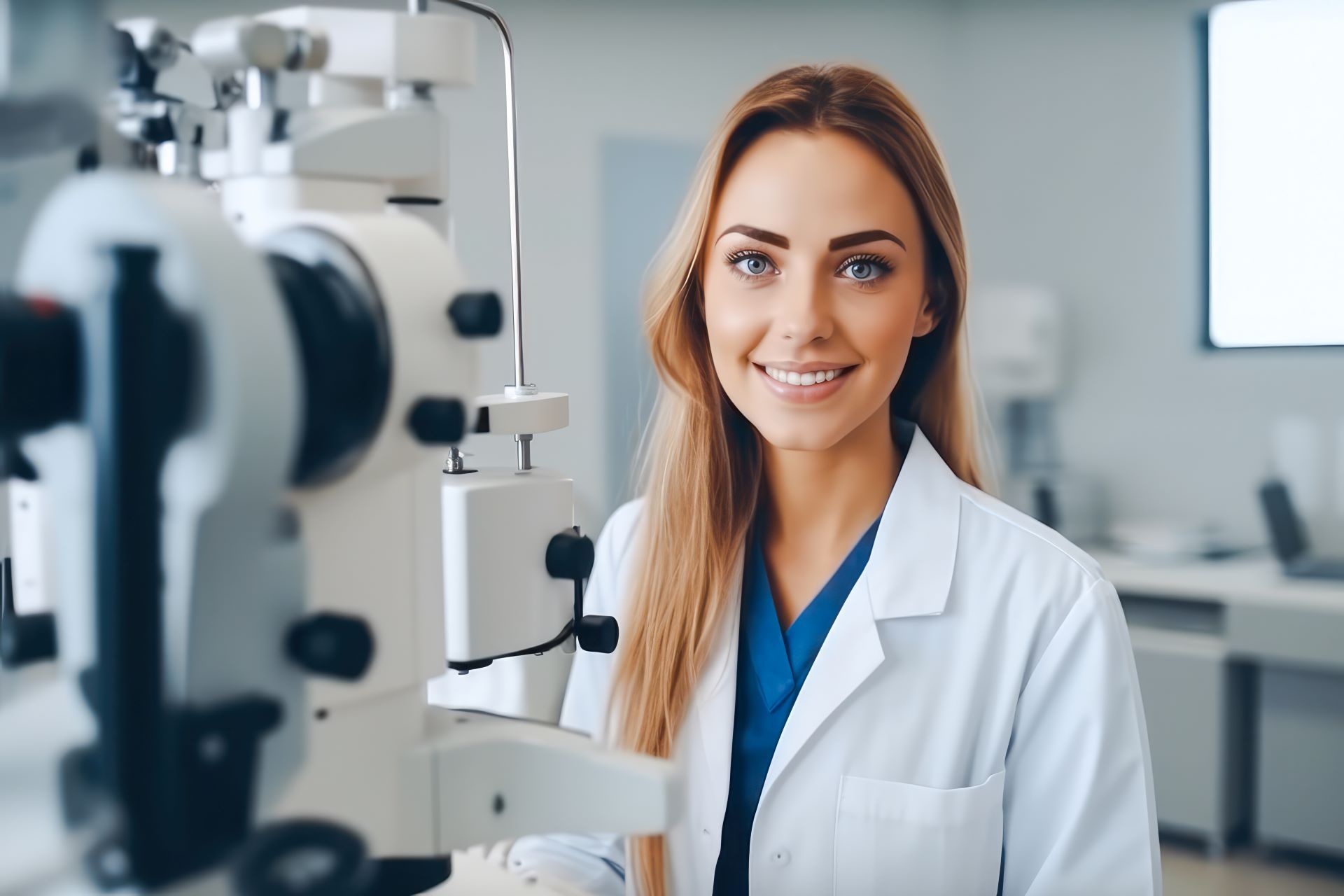Unlock a World-Class Surgeon Network for LASIK in Buffalo with Top LASIK Brands. Trusted names in vision correction, TLC Laser Eye Center and The LASIK Vision Institute offer cutting-edge LASIK procedures performed by expert surgeons.
Experience the clarity and freedom of improved vision with advanced FDA approved LASIK technology including custom Wavefront all-laser LASIK and personalized patient care. Take the first step towards clear, glasses-free vision – explore our renowned surgeon network and book your free consultation today!
Benefits of LASIK in Buffalo NY:

- Improved Vision: LASIK can significantly improve your vision, allowing you to see clearly without the need for glasses or contact lenses. Many patients experience 20/20 vision or better after LASIK, enhancing their quality of life and overall visual experience.
- Convenience and Freedom: Say goodbye to the hassles of glasses and contact lenses. With LASIK, you can enjoy the freedom of clear vision throughout the day, whether it’s for work, sports, or leisure activities. No more worrying about misplaced glasses or discomfort from contact lenses.
- Enhanced Performance: LASIK can improve your performance in various activities. Athletes, in particular, benefit from the improved visual acuity and reduced dependency on corrective eyewear. Whether you’re playing sports or engaging in outdoor activities, LASIK can give you a competitive edge.
- Cost Savings: Over time, the cost of glasses, contact lenses, and associated maintenance can add up. LASIK offers a long-term cost-saving advantage as it eliminates or reduces the need for these expenses. While the upfront cost of LASIK may seem significant, it can be a worthwhile investment in the long run.
- Quick Recovery: LASIK offers a relatively quick recovery time compared to other surgical procedures. Most patients experience improved vision within 24 to 48 hours after the surgery. You can resume your daily activities with minimal downtime, enjoying the benefits of clear vision sooner.
Take $1000* OFF LASIK
claim your offer today!What Makes LASIK in Buffalo, NY a Smart Choice?
In Buffalo, NY, the ongoing growth for LASIK as a vision correction option is evident. At TLC Laser Eye Centers, we prioritize the importance of your eyesight. We understand that the selection of the right LASIK eye surgeon plays a pivotal role in your decision-making. To facilitate this pivotal decision, through our surgeon network, we can confidently refer you to The LASIK Vision Institute, filling the gap in our presence within the Buffalo NY region.
Cost of LASIK Surgery in Buffalo, NY:
The cost of LASIK surgery in Buffalo NY can vary depending on several factors, including the specific procedure, the technology used, and the individual needs of the patient. To get an accurate estimate of the cost, we recommend scheduling a consultation at TLC Laser Eye Surgery Center near you or through our surgeon network we can confidently refer you to, The LASIK Vision Institute. Our friendly staff can provide you with a personalized evaluation and discuss the associated costs. We also offer affordable financing options to help make LASIK more accessible for our patients.
When comparing LASIK costs, consider the doctor’s experience and technology used, as cheaper prices could mean less expertise and outdated lasers. Low initial quotes may not include comprehensive evaluations, follow-ups, and extra services like bladeless LASIK or Wavefront mapping. While tempting, an unusually low LASIK price could indicate cut corners. Focus on quality over cost when researching your LASIK provider.
Does Insurance cover LASIK in Buffalo NY?:
While most insurance plans do not typically cover LASIK as it is considered an elective procedure, it’s advisable to check with your insurance provider to understand their specific coverage policies. At TLC Laser Eye Surgery Center, we strive to make LASIK affordable and accessible in Buffalo NY. We offer various financing programs that can help you manage the cost of the procedure. Our team will work closely with you to explore the best financial options available.
FAQs about LASIK Eye Surgery in Buffalo, NY:
Considering LASIK eye surgery in Buffalo, NY? Here are some frequently asked questions to help you better understand the procedure:
- What is LASIK? LASIK (Laser-Assisted In Situ Keratomileusis) is a popular refractive surgery that uses a laser to reshape the cornea, correcting common vision problems such as nearsightedness, farsightedness, and astigmatism. It is a safe and effective procedure that can significantly reduce or eliminate the need for glasses or contact lenses.
- Am I a candidate for LASIK? Determining your candidacy requires a comprehensive eye examination. Generally, suitable candidates are over 18 years old, have a stable vision prescription, and are in good overall eye health. Our experienced team will evaluate your specific circumstances and advise you on the best course of action.
- Does LASIK hurt? During the LASIK procedure, numbing eye drops are used to ensure your comfort. While you may experience slight pressure or mild discomfort, the surgery itself is typically painless. Many patients report improved vision shortly after the procedure.
- What is the recovery process like? LASIK offers a relatively quick recovery time. Most patients notice improved vision within 24 to 48 hours after the surgery. You may experience some mild temporary side effects, such as dry eyes or sensitivity to light, but these typically subside within a few days.
Who is a candidate for LASIK in Buffalo, NY?
LASIK is a highly effective vision correction procedure, but not everyone is a suitable candidate. Here are some general criteria for LASIK candidacy in Buffalo, NY:
- Stable Vision: To be considered for LASIK, your vision prescription should have remained stable for at least one year. Fluctuating vision can affect the accuracy of the procedure’s results.
- Age Requirement: Most LASIK surgeons in Buffalo, NY recommend that candidates be at least 18 years old. This is because the eyes typically stabilize in their development by this age.
- Good Overall Eye Health: Candidates should have healthy eyes, free from any conditions such as glaucoma, cataracts, or severe dry eye syndrome. Additionally, certain corneal conditions or diseases may impact candidacy, which can be evaluated during a comprehensive eye examination.
- Realistic Expectations: Candidates should have realistic expectations about the outcomes of LASIK. While the procedure can significantly reduce dependence on glasses or contact lenses, it may not guarantee perfect vision or eliminate the need for reading glasses as you age.
It’s important to note that determining candidacy for LASIK requires a thorough evaluation by an experienced LASIK surgeon in Buffalo, NY. They will assess your individual eye health and vision needs to determine if LASIK is the right option for you.
How long is LASIK recovery in Buffalo, NY?
LASIK offers a relatively quick recovery time compared to other surgical procedures. While individual experiences may vary, here is a general timeline of what to expect during LASIK recovery in Buffalo, NY:
- Immediate Post-Operative Period: After the LASIK procedure, you may experience some mild discomfort, such as a gritty sensation or slight burning. Your eyes may be sensitive to light, and your vision may be temporarily blurry or hazy immediately after the surgery. These effects are normal and should subside within a few hours.
- First 24 to 48 Hours: In the first day or two following LASIK, you will likely notice improvements in your vision. However, it’s common to experience some fluctuation and mild visual disturbances during this time. It’s important to follow the post-operative instructions provided by your Buffalo, NY LASIK surgeon, which may include using prescribed eye drops and avoiding activities that can strain your eyes.
- Initial Weeks: Over the course of the first few weeks, your vision will continue to stabilize. You may have scheduled follow-up visits with your LASIK surgeon in Buffalo, NY to monitor your progress and ensure proper healing. During this period, it’s important to avoid rubbing your eyes and to protect them from irritants such as dust or chemicals.
- Long-Term Recovery: While you will likely experience significant visual improvement within the first few weeks, it’s important to note that your eyes will continue to heal and adjust over several months. Most patients in Buffalo, NY achieve their final visual acuity within three to six months after LASIK.
During the recovery period, it’s crucial to attend all post-operative appointments with your Buffalo, NY LASIK surgeon and follow their instructions diligently. If you have any concerns or questions about your recovery, don’t hesitate to reach out to them.
Remember that these are general guidelines, and individual experiences may vary. Your LASIK surgeon in Buffalo, NY will provide you with specific instructions and guidance tailored to your unique circumstances to ensure a smooth and successful recovery.
Understanding Common Vision Problems: Myopia, Hyperopia, and Astigmatism
Over 70 million people in North America, about one in four, have myopia (nearsightedness). Myopia causes blurred distant vision, with severity determining how clear distant objects appear. Highly myopic people likely have thick glasses. We will explore common vision conditions – myopia, hyperopia (farsightedness), and astigmatism – that cause blurred vision.
Normal Vision
Normal vision depends on light rays precisely converging on the retina. The eye’s cornea, lens, and vitreous body refract (bend) light at the right angles for sharp image projection onto the retina. This total refraction measures in diopters. Zero diopters represents flawless focusing with no image distortion.
Myopia (Nearsightedness)
Myopia typically results from an elongated eyeball, prematurely converging light rays in front of the retina. This blurred distant vision severity relates to when objects appear clear – severe myopia limits this to a few inches while milder cases can see clearly for yards. Corrective lenses reduce overall eye refractive power, shifting the focal point back onto the retina.
Hyperopia (Farsightedness)
Hyperopia arises from a shortened eyeball, delaying light ray convergence behind the retina, blurring near vision first. Distance clarity remains thanks to lens compensation. However, eye strain and headaches commonly occur from constant focusing efforts. Most cope until around 40 years old when presbyopia limits lens flexibility. Some cannot overcome severe hyperopia without vision correction. Treatment increases overall eye refractive power, moving the focal point onto the retina.
Astigmatism
Astigmatism occurs when the typically spherical cornea has an irregular “egg” shape. Consequently, multiple focal points within the eye lead to uneven, distorted bending of incoming light. This results in image tilting regardless of object distance. Many myopic and hyperopic patients also exhibit astigmatism to some degree. Marked astigmatism substantially degrades all vision.
Conclusion
Myopia, hyperopia, and astigmatism comprise common vision abnormalities causing blurred sight. Each stems from optical refraction issues that can often improve with corrective surgery. Understanding these conditions aids in preserving eye health and visual acuity.
